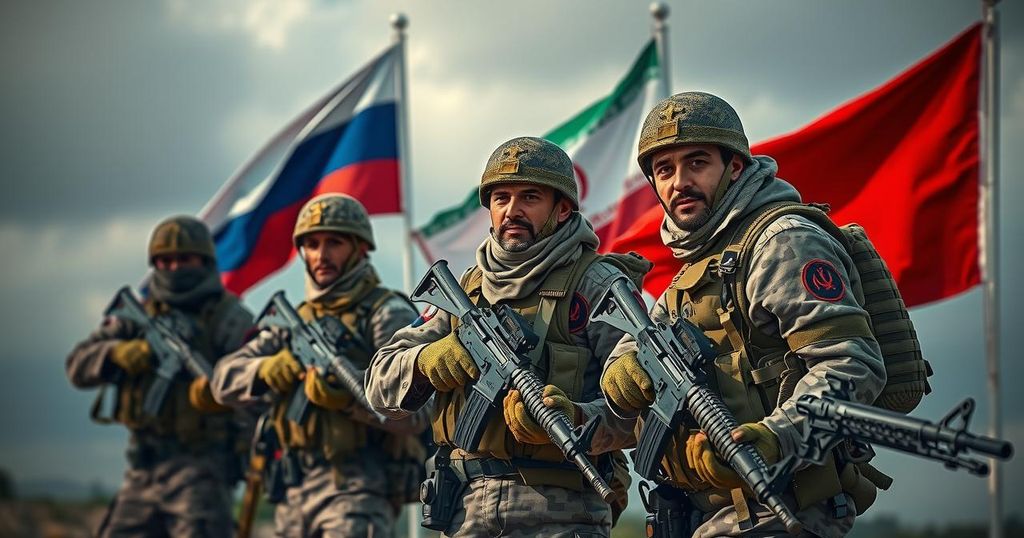The Strategic Implications of Russia Recruiting Yemeni Mercenaries through Houthis

Russia’s recruitment of Yemeni fighters, facilitated through the Houthis, reflects growing ties that serve multiple strategic objectives, escalating regional tensions while enhancing the capabilities of the Houthis. Reports suggest the potential for weapon transfers and intelligence sharing, highlighting risks for international shipping and US interests in the region.
Recent reports indicate that Russian armed forces have successfully recruited hundreds of Yemeni men into their ranks, facilitated by an increasingly cooperative relationship with the Houthi rebels. These recruits, who were lured by promises of high salaries and potential Russian citizenship, were funneled through a Houthi-associated company and subsequently coerced into military service for Russia. This recruitment strategy may yield financial benefits for the Houthis and provide military training opportunities for young Yemeni men in territories under their control. The initiative is part of a broader Russian strategy designed to utilize migrant recruits from countries such as Yemen, Nepal, India, and North Korea to mitigate significant combat losses on various fronts, particularly in Ukraine.
Furthermore, the cultivation of ties between Russia and the Houthis has gained traction following the October 7, 2023, attacks by Hamas on Israel, positioning the Houthis as vital players in Iran’s “Axis of Resistance.” Historically perceived as mere proxies of Iran, the Houthis are now emerging as key components of Iran’s regional strategy against Western influence. Although there is no direct evidence of Russian weapon transfers to the Houthis, reports suggest that Russia may be negotiating to supply advanced weaponry, including P-800 Oniks anti-ship missiles. Recent discussions involving US Special Envoy for Yemen Timothy Lenderking indicate that Russia is seeking to strengthen its ties with the group, which could include arms shipments worth millions of dollars and intelligence support tailored for operations against international maritime targets.
From Russia’s standpoint, collaboration with the Houthis extends beyond addressing its military casualties in Ukraine. By providing arms and intelligence, Russia incentivizes further destabilization in the Red Sea region, thereby exerting pressure on Western shipping routes and reducing focus on Moscow’s actions in Ukraine. Moreover, an alliance with the Houthis could enhance Russia’s leverage over key regional actors such as the United Arab Emirates and Saudi Arabia, particularly regarding their interests in the ongoing Yemeni conflict. The Kremlin has a long-standing desire to maintain relations with Gulf states, especially through the OPEC+ framework, but the newly forged ties with the Houthis may serve as a bargaining tool against these state actors.
However, it is crucial to interpret Russia’s relationship with the Houthis as strategic convenience rather than a comprehensive alliance. Moscow is likely to assess and modulate its support based on the Houthis’ actions and adherence to Russian interests, particularly concerning Saudi and Emirati targets. Additionally, Russia has maintained diplomatic interactions with other factions in Yemen, indicating a balanced approach to its foreign policy in the region.
The United States and its allies must be cautious regarding the ongoing collaboration between the Houthis and Russia, as this could significantly enhance the Houthis’ capabilities to threaten international maritime operations and jeopardize US interests in the area. Even without advanced weaponry from Russia, the Houthis have already disrupted maritime trade tremendously, illustrating their growing threat. Should Russia provide sophisticated systems or expertise in military production, it would empower the Houthis further, making them less reliant on Iranian support and potentially more willing to act independently or aggressively in future conflicts.
The current dynamics of Middle Eastern geopolitics are substantially shaped by Russia’s involvement with regional actors, notably the Houthis in Yemen. Historically regarded as proxies of Iran, the Houthis have increasingly positioned themselves within a larger coalition of Iran-aligned groups opposing Western intervention. Recent geopolitical developments, including the Hamas assault on Israel, have intensified the focus on alliances amongst US adversaries, particularly as Russia seeks to solidify ties that may enable it to exert influence over crucial maritime routes and challenge Western dominance in the region. Furthermore, the ongoing conflict in Yemen presents opportunities for Russia to recruit fighters while simultaneously leveraging relationships with other significant powers in the area.
In conclusion, Russia’s strategic recruitment of Yemeni mercenaries underlines the increasingly intricate ties between Moscow and Houthi rebels, influenced by shifting regional dynamics post-Hamas’ October 7 attack. This collaboration not only serves to augment Russia’s military strength amid ongoing challenges in Ukraine but also offers the Houthis enhanced military capacities and financial gain. The nexus of Russian support for the Houthis, while appearing opportunistic, underscores Russia’s broader ambitions to destabilize Western maritime interests and influence Middle Eastern geopolitics at the expense of traditional US allies.
Original Source: www.atlanticcouncil.org






